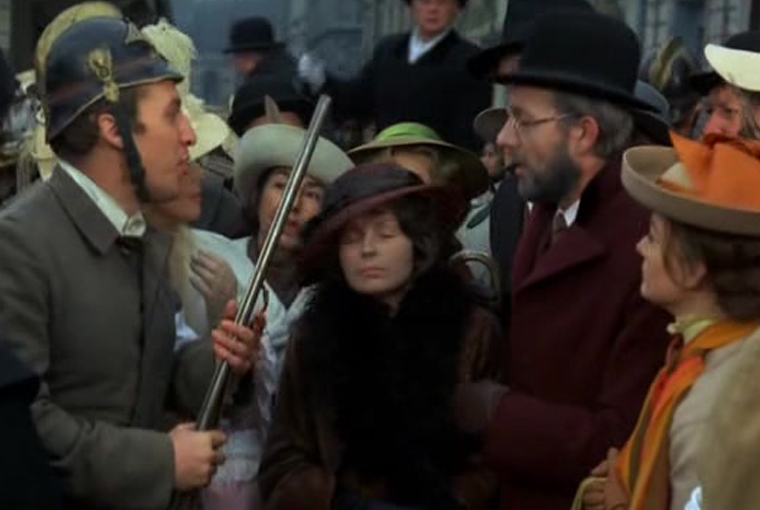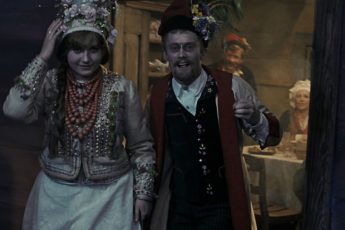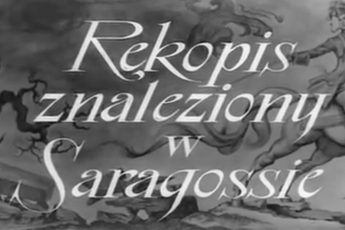A Woman's Strive for Love and Hope in Wartime
Jerzy Antczak’s Nights & Days (Noce i dnie, 1975)
Vol. 46 (October 2014) by Jack Page
Published between 1932 and 1934, Maria Dąbrowska’s critically acclaimed novel – consisting of four volumes – is an extensively personal literary achievement, the entirety of which has yet to receive an English translation. The epic “family saga” entitled Nights and Days (Noce i dnie) reflects the Polish author’s own liberal political agenda, exploring themes of social justice with insightful depictions of class hierarchies and an intimate documentation of a country at war. Dąbrowska’s story is by no means a selective history and Jerzy Antczak’s 1975 Academy Award nominated twelve-part adaptation is a testament to the level of detail and the amount of life Dąbrowska wishes to encompass in her book.
The aforementioned chapters that divide the film into its separate episodes amplify the narrative’s serial chronology. Consequently, the audience is not only deeply invested with the characters emotionally, but also temporally. This vast amount of spectatorial dedication (approximately 632 minutes in total) is an impressive feat rarely employed by cinema, yet the connection between viewers and the Niechcic family has never been so uniquely strengthened by this elongated exposure of screen time they share. Nights and Days chronicles two generations of the Niechcics and how their family dynamic and lifestyles are impacted by the 1863 January Uprising, the 1905 Russian Revolution and the outbreak of World War I.
The rudimentary (almost televisual) aesthetic of Nights and Days shifts the focus from style to substance and its subjects. Much like Dąbrowska’s source text the film is based on, the social commentary is encapsulated by the relationships between the people and the classes. By so doing, Dąbrowska and director Antczak are able to localise global issues, mirroring the ideology of a country where individual and societal issues are projected onto the family. Although Nights and Days is universally considered a faithful adaptation, some scholars and academics have argued that the film lacks Dąbrowska’s politically charged voice. Perhaps a result of passing the communist censorship, the film’s so-called neutrality is compensated for by the explicit context of war-torn Poland that lingers omnipresent in the background of the narrative.
Jadwiga Baranska as Barbara Niechcic – an uncompromising performance – is an ideological figure of utmost importance in Nights and Days. At the beginning of the story, while encountering her future suitor, Barbara is described as having a “free yet restrained manner and uninhibited movements”1. Already, her character is constructed as a blithe spirit, behaving as expected of her by her gentry elders, yet still retaining a distinct personality and presence that allows her to stand out among the other guests at the ball. Bogumil’s first impression of Barbara is conveyed as carrying an inherently resilient quality. Found only in the outlining of her general facial features, Dąbrowska’s brief explanation is sufficient enough information to portray the character’s effortless geniality and solemnity. She writes:
She looked eighteen at most, her hair was black and cut short like a boy’s, her eyes – he did not yet have time to notice their color; her face, small, but clearly delineated, proud and sincere.2
Barbara Niechcic is portrayed as a doting wife and mother in the utmost naturalistic way. When her son Tomasz is accused of thievery, her breakdown is conveyed by Jadwiga Baranska in a ferociously dramatic outburst that never risks becoming too theatrical. As the years and unfortunate incidents that inexorably occur in a life pass (Barbara’s sister, mother and uncle die, her husband Bogumil commits adultery, and she herself is wrongly evicted from her household), Barbara’s complexion is gradually worn away. Her unassuming, womanly features slowly vanish as her emotional and psychological distress becomes etched into her once stoic disposition. Life is unkind to Barbara and yet she is always prepared to forget and forgive those who hurt her. When Bogumil dies, Barbara is still painfully upset, even with the knowledge that he had on a number of occasions been unfaithful to her and exploited her financial gain for his own business. In this instance – and many others like it – she refuses to accept any complications of guilt and relief that may arise with the death of her selfish partner. Barbara also remains as decisive and as independent as she had been as a married woman after her husband passes away. Her loyalty is to her children, whom she always puts before herself regardless of the sacrifice or the repercussions she may have to face.
For these reasons, the character (as well as the performance) of Barbara Niechcic in Nights and Days is considerably one of the most strikingly progressive and modern figures of womanhood and represented femininity in literature and cinema. Barbara is the moral compass upon which all the other character’s moral and ethical dilemmas are measured against or dependent on. Her relationship with Bogumil is not one of unequal gender stereotypes. His own philandering and exploitative nature that seems to only take from his wife and never give back suggest that he is the weak link in the couple and therefore the family name in general. Barbara is as much a prospective businessman as he and – defiantly ignoring the requests and recommendations of her husband – invests in her own land ownership with her uncle’s inheritance.
Notably, as time goes by, the Niechcics are frequently moving estates as Barbara questions where exactly she truly belongs, an attitude that is no doubt analogous to Poland’s own national identity crisis. From Krempa to Serbinow, Kaliniec to Pamietow – and Paris and Brussels in between – the geography and location of the film’s setting foretells the shifting landscape of Europe after the invasions and civil wars at home in Poland and elsewhere around the world.
Nights and Days is, first and foremost, a love story. Recounted by Barbara’s nostalgic reveries, the Niechcics’ marriage spans nearly forty years. As the noble upper classes become impoverished and the intimate conflicts of the Niechcic family unfold, there remain two constants: the love Barbara has for her family and the hope that her love against all odds instils in the rest of us. Nights and Days is then, an exercise in humanity’s capability to love and hope, even in the most extreme circumstances.




Leave a Comment